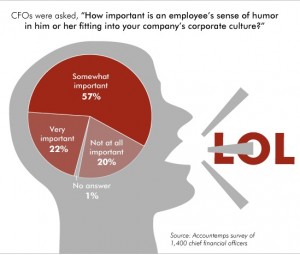 Candidates and hiring companies have at least one thing in common: Both are looking for the perfect match.
Candidates and hiring companies have at least one thing in common: Both are looking for the perfect match.
Skills, knowledge, and experience are the tangibles to determine a functional fit within an organization. Aspects of values and personality may determine one’s ability to adapt to an organization’s culture. Recruiters, human resources professionals, and hiring managers understand the value of assessing a candidate’s potential cultural fit. Poor cultural fit is something that cannot be resolved with training.
Cultural fit goes beyond simply getting along with fellow workers. For example, according to an Accountempts survey, “Nearly eight in 10 (79%) chief financial officers (CFOs) interviewed said an employee’s sense of humor is important for fitting into the company’s corporate culture.” That is important to the employer and the employee. If you are going to spend more than 40 hours per week working, you want to be with people with whom you can relate.
There are several methods that employers, recruiters, and candidates use to ensure a cultural match is made.
Job Posting
An employer can signal candidates by writing a detailed job posting including information about the company and its culture. The description will hopefully attract candidates of like mind and deter candidates with opposing values. Take a look at these sample postings — Apple, Kaiser Permanente, Solutions IQ. Can you determine if you would be a cultural match?
Résumé
Just as an employer communicates their values through the job posting, a candidate can share their values through the résumé.
Candidates should be careful not to go over the top. For example, résumés should focus on skills, accomplishments, and knowledge. Through achievements employees can demonstrate values such as customer care, attention to quality, and on-time delivery of projects. Characteristics such as humor and honesty are not necessary to list on a résumé. A candidate can also show compassion through community and philanthropic roles.
Interviewing
Employers may ask questions to uncover a candidate’s work ethics, personal values, and work style. This may be achieved through situational questions in which the interviewer inquires about a choice a candidate may make or how they would solve a particular problem. To determine fit, often multiple team members will interview the candidate.
Testing
Some employers use psychometric tests to learn more about a candidate’s personality traits, and how they will interact with others in the company. According to Sanford Rose, “It has been estimated that 30% of all companies have incorporated some sort of personality testing into their hiring process.”
Internet Search
Employers can gain insight into an employee’s personality by reviewing a candidate’s postings on social media sites. Candidates can learn about a company by searching online and especially reviewing the corporate website.
Job Shadowing
A trial day or even few hours is a great way to for the candidate and the hiring company to evaluate each other.
It is beneficial to the employer and the candidate to be forthright and honest throughout the job/candidate selection process. Any manipulation or false representation can result in a mismatch, which is a setback for the employer and the employee. With openness during the process, a perfect match can be found.